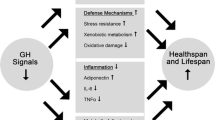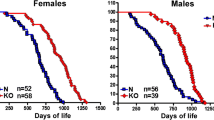Abstract
Reducing the intake of food in rodents inhibitsbody growth, retards most physiologicalageing processes, delays the onset ofpathology and prolongs life. Food restriction(FR) reduces pituitary hormone secretion andin consequence has been called`functional hypophysectomy'. Direct life-longcomparisons in the rat showedthat hypophysectomy (HYP) (a complete absenceof pituitary hormones) has a greateranti-ageing action than FR (a partial lack ofpituitary hormones) on collagen, kidneyand muscle. This suggests that pituitaryhormones accelerate ageing. Recent Americanresearch on genetic variants of the mouseindicates that pituitary growth hormone (GH)may accelerate ageing and shorten life. Boththe Snell and Ames dwarf mice have adeficiency of pituitary GH and live 50%longer than normal mice. The Snell dwarfmouse has retarded ageing of both collagen andimmune functions. The Ames dwarfmouse has high antioxidant enzyme activitiesin liver and kidney. A transgenic humanGH mouse is short lived, has a low activity ofantioxidant enzymes in liver and kidneyand an early development of disease in theseorgans. It is postulated that FR byreducing the secretion of pituitary hormones,such as GH, diminishes the oxidativedamage of certain tissues, thereby delayingthe development of age-related diseases inthese tissues and by this means extendslife.
Similar content being viewed by others
References
Akisaka M, Asato L, Chan YC, Suzuki M, Uezato T and Yamamoto S (1996) Energy and nutrient intakes of Okinawan centenarians. J Nutr Sci Vitaminol 42: 241–248
Armario A, Montero JL and Jolin T (1987) Chronic food restriction and circulating rhythms of pituitary-adrenal hormones, growth hormone and thyroid stimulating hormone. Ann Nutr Metab 31: 81–87
Bartke A, Coschigano K, Kopchick J, Chandrashekar V, Mattison J, Kinney B and Hauck S (2001) Genes that prolong life: relationships of growth hormone and growth to aging and life span. J Gerontol 56: B340–B349
Bolzan AD, Brown OA, Goya RG and Bianchi MS (1995) Hormonal modulation of antioxidant enzyme activities in young and old rats. Exp Gerontol 30: 169–175
Campbell GA, Kurcz M, Marshall S and Meites J (1977) Effects of starvation in rats on serum levels of follicle stimulating hormone, thyrotropin, growth hormone and prolactin: response to LH releasing hormone and thyrotropin releasing hormone. Endocrinology 100: 580–587
Everitt A and Meites J (1989) Minireview: aging and antiaging effects of hormones. J Gerontol 44: B139–B147
Everitt AV (1971) The hormonal control of ageing and longevity. Proc Aust Assoc Gerontol 1: 127–132
Everitt AV (1976) Hypophysectomy and aging in the rat. In: Everitt AV and Burgess JA (eds) Hypothalamus, Pituitary and Aging, pp 68–85. CC Thomas, Springfield, Illinois
Everitt AV, Seedsman NJ and Jones F (1980) The effects of hypophysectomy and continuous food restriction, begun at ages 70 and 400 days, on collagen aging, proteinuria, incidence of pathology and longevity in the male rat. Mech Ageing Dev 12: 161–172
Everitt AV and Wyndham J (1982) Hypothalamic-pituitary regulation and aging. In: Adelman RC and Roth GS (eds) Endocrine and Neuroendocrine Mechanisms of Aging, pp 123–165. CRC Press, Boca Raton, Florida
Flurkey K, Papaconstantinou J, Miller RA and Harrison DE (2001) Lifespan extension and delayed immune and collagen aging in mutant mice with defects in growth hormone production. Proc Natl Acad Sci USA 98: 6736–6741
Gautsch TA, Kandl SM, Donovan SM and Layman DK (1998) Response of the IGF-1 system to prolonged undernutrition and its involvement in somatic and skeletal muscle retardation in rats. Growth Dev Aging 62: 13–25
Gong X, Shang F, Obin M, Palmer H, Scofrano MM, Jahngen-Hodge J, Smith DE and Taylor A (1997) Antioxidant enzyme activities in lens, liver and kidney of calorie restricted Emory mice. Mech Ageing Dev 99: 181–192
Gomi F and Matsuo M (1998) Effects of aging and food restriction on the antioxidant enzyme activity of rat livers. J Gerontol 53: B161–B167
Han E-S, Lu DH and Nelson JF (1998) Food restriction differently affects mRNAs encoding the major anterior pituitary tropic hormones. J Gerontol 53: B322–B329
Han E-S, Evans TR, Shu JH, Lee S and Nelson JF (2001) Food restriction enhances endogenous and corticotropin-induced plasma elevations of free but not total corticosterone throughout life in rats. J Gerontol 56: B391–B397
Hauck SJ and Bartke A (2001) Free radical defenses in liver and kidney of human growth hormone transgenic mice. Possible mechanisms of early mortality. J Gerontol 56: B153–B165
Herlihy JT, Stacy C and Bertrand HA (1990) Long-term food restriction depresses serum thyroid hormone concentrations in the rat. Mech Ageing Dev 53: 9–16
Holliday R (1989) Food, reproduction and longevity: is the extended lifespan of calorie-restricted animals an evolutionary adaptation? BioEssays 10: 125–127
McCay CM, Crowell MF and Maynard LA (1935) The effects of retarded growth upon the length of life and upon ultimate body size. J Nutr 10: 63–79
Masoro EJ (1995) Antiaging action of caloric restriction. Endocrine and metabolic aspects. Obesity Res 3(Suppl 2): 241s–247s
Masoro EJ (2001) Dietary restriction: an experimental approach to the study of the biology of aging. In: Masoro EJ and Austad SN (eds) Handbook of the Biology of Aging, 5th ed, pp 396–420. Academic Press, San Diego, California
Meites J (1989) Evidence that underfeeding acts via the neuroendocrine system to influence aging processes. Prog Clin Biol Res 287: 169–180
Mobbs CV, Bray GA, Atkinson RL, Bartke A, Finch CE, Maratos-Flier E, Crawley JN and Nelson JF (2001) Neuroendocrine and pharmacological manipulations to assess how caloric restriction increases life span. J Gerontol 56A (special issue): 34–44
Mulinos MG and Pomerantz L (1940) Pseudo-hypophysectomy: condition resembling hypophysectomy produced by malnutrition. J Nutr 19: 493–504
Rao G, Xia E, Nadakavukaren MJ and Richardson A (1990) Effect of dietary restriction on the age-dependant changes in the expression of antioxidant enzymes in rat liver. J Nutr 120: 602–609
Roth GS, Ingram DK and Lane MA (2001) Caloric restriction in primates and relevance to humans. Ann NY Acad Sci 928: 305–315
Shorey CD, Everitt AV, Armstrong RA and Manning LA (1993) Morphometric analysis of the muscle fibres of the soleus muscle of the ageing rat: long-term effect of hypophysectomy and food restriction. Gerontology 39: 80–92
Short R, Williams DD and Bowden DM (1997) Circulating antioxidants as determinants of the rate of biological aging in pigtail macaques (Macaca nemestrina). J Gerontol 52: B26–B38
Sohal RS and Weindruch R (1996) Oxidative stress, caloric restriction, and aging. Science 273: 59–63
Turturro A, Witt WW, Lewis S, Hass BS, Lipman RD and Hart RW (1999) Growth curves and survival characteristics of the animals used in the biomarkers of aging program. J Gerontol 54: B492–B501
Weindruch R and Walford RL (1988a) The Retardation of Aging and Disease by Dietary Restriction. CC Thomas, Springfield, Illinois
Weindruch R and Walford RL (1988b) Mechanisms: How does dietary restriction retard aging? In: Weindruch R and Walford RL (eds) The Retardation of Aging and Disease by Dietary Restriction, pp 231–294. CC Thomas, Springfield, Illinois
Wyndham JR, Everitt AV, Eyland A and Major J (1987) Inhibitory effect of hypophysectomy and food restriction on glomerular basement membrane thickening, proteinuria and renal enlargement in aging male Wistar rats. Arch Gerontol Geriatr 6: 323–337
Yu BP (1996) Aging and oxidative stress: modulation by dietary restriction. Free Radic Biol Med 21: 651–668
Author information
Authors and Affiliations
Rights and permissions
About this article
Cite this article
Everitt, A.V. Food restriction, pituitary hormones and ageing. Biogerontology 4, 47–50 (2003). https://doi.org/10.1023/A:1022439701606
Issue Date:
DOI: https://doi.org/10.1023/A:1022439701606




